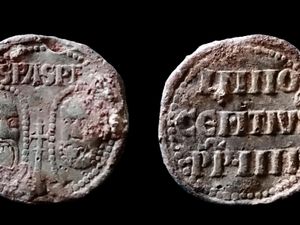Medieval Pope’s seal discovered in Shropshire
The coin-like object was used to confer political and religious favours.

A pope’s seal dating back 700 years has been discovered in Shropshire.
The medieval find represents the 1.5 millionth archaeological object to have been officially unearthed by the public in Britain.
Pope Innocent IV, whose papacy began in 1243, used the lead coin-like object to confer political and religious favours.
Metal detectorist Andy Bassett found the object in a ploughed field in Shropshire and its discovery has now been officially recorded.

Peter Reavill, the British Museum’s Portable Antiquities Scheme finds liaison officer for Shropshire and Herefordshire, said the seal may have ended up in Shropshire because the Pope was trying to obtain Henry III’s support in his claim for Sicily.
Or it may have been given as an “indulgence” to a rich, powerful individual who gave money to the church in exchange for “so many years out of purgatory.”
Mr Reavill told the PA news agency: “We don’t know who he (the Pope) sent the letter to. All we know is the lead seal has dropped off.”
While the seal, which would have been kept as a “talisman”, does not have a huge value, “the archaeology of the region is definitely richer for its find,” he said.

The object is the 1.5 millionth to be discovered in the British Museum’s Portable Antiquities Scheme (PAS).
It was created in 1997 so archaeological objects found by the public can be recorded to help advance knowledge of the past.
Experts say the finds, which have included the gold treasures of the Staffordshire Hoard, have radically transformed what “is known about life through time on the British Isles.”
The seal was found before metal-detecting was prohibited under the lockdown.
Museum director Hartwig Fischer said: “We look forward to many more objects being recorded, and who knows what exciting discoveries are yet to be found.”
Under the Treasure Act in 1996, finders have to report all finds of potential treasure to the local coroner.
The British Museum and BBC History Magazine have published a list of 10 of the most important discoveries of the past 23 years.
They include gold vessel the Ringlemere Cup; the 2,581 coins known as the Chew Valley Hoard; the Staffordshire Moorlands pan and the Staffordshire Hoard – the largest find of Anglo-Saxon gold.
Michael Lewis, head of the PAS and Treasure at the British Museum, said that “even the smallest and most modest items offer clues about our history, so we encourage everyone who makes a find to continue to come forward.”





